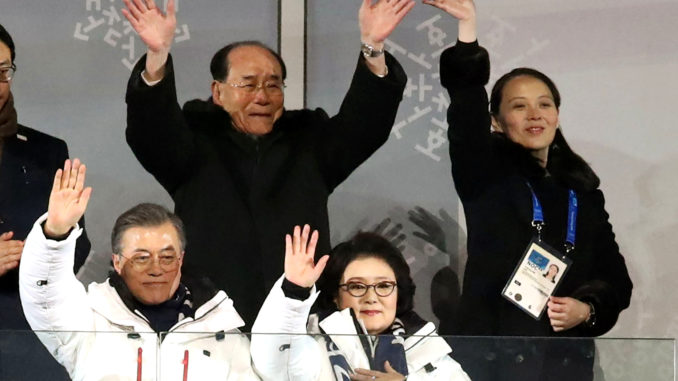
The idea of holding the 2018 Winter Olympics in South Korea seemed destined to fail. The interests of three key actors – the United States, South Korea, and North Korea – were so different that it seemed impossible to find working compromises between them.
And yet it was an unexpected relative success. Diplomacy won out. This was very largely due to the remarkable and unsuspected diplomatic skills of one person: President Moon Jae-in of South Korea. Let us review the issues about which there was deep disagreement, and spell out the positions of the three governments as of the beginning of the year 2018.
U.S. President Trump did not want North Korea even to attend the Olympics. He was intent on finding ways to punish North Korea for defying various United Nations resolutions. He insisted that North Korea renounce the use of nuclear weapons and destroy those that they already had. He intended to engage in military maneuvers that would impress the North Korean regime with the folly of resisting the U.S. demands. He was opposed to any diplomatic discussions with the North Korean regime until they agreed in principle to these demands.
The North Korean leader, Kim Jong-un, rejected firmly any idea of denuclearization. He said he would be willing to meet with President Trump only if the meeting were without preconditions and if the United States would cease its aggressive actions against North Korea, such as military maneuvers. He also said that these matters could only be discussed in a one-to-one meeting of North Korea and the United States. He specifically rejected any alternative group as a meeting partner such as the so-called Group of Six (the five members of the U.N. Security Council plus Germany). He also refused the presence of South Korea at the meeting.
In this dangerous situation of total blockage, President Moon sought to find space for a third position. He wanted to reassure the United States that South Korea still valued, above all, its alliance with the United States. He also wished to persuade North Korea to reduce tensions on the Korean peninsula.
The first achievement of South Korea’s president was to obtain the consent of North Korea to participate in the Olympics. He also obtained North Korea’s support to have a joint presence of their teams under one flag. In one sport a single joint team was created.
President Moon sought to assure the United States that he wished to maintain the same high level of alliance that had been functioning for a long time. However, he suggested postponing the maneuvers until after the Olympics. Reluctantly, the United States agreed.
President Moon then sought to get North Korea to impose a temporary truce in rocket launchings until after the Olympics. North Korea tacitly agreed. Presumably, this opened the way to high-level participants on both sides. Each country attended the opening sessions with a top official, plus a woman close to the leader.
In the case of North Korea, it was the nominal head of state, Kim Yong chol, as chair of the North Korean delegation plus Kim Yo-jong, sister and confidant of North Korea’s leader. She arrived with an invitation to President Moon to visit North Korea. In the U.S. case, it was Vice-President Pence and Ivanka Trump, daughter and confidant of President Trump.
Although the United States was against meetings with North Koreans, a private channel was used to arrange a meeting between Vice-President Pence and the North Koreans. However, in order to appease U.S. supporters of President Trump, Vice-President Pence delivered a public denunciation of the North Korean regime. The North Korean response to this public slap was to cancel the meeting with Pence at the very last minute.
Nonetheless, both the North Korean and U.S. representatives attended the closing session. They studiously avoided any contact with each other, but they also avoided mutual denunciations.
How can we interpret what happened? The North Korean regime made some quiet concessions, which were in reality temporary. Nevertheless, they did make them. Trump made some bigger concessions, which were also in reality temporary. President Moon obtained the credit, both within South Korea and elsewhere, of creating this truce for peace. Even some of South Korea’s conservatives saw some value in what had been achieved.
At the closing session, the North Koreans stated that relations between North and South Korea should “improve together.” Will they now? And will there now be another U.S.-North Korea official meeting? Nothing is less sure. But the tail wind is with President Moon, who thereby is unquestionably the great victor of the Olympics negotiations. He bent the North Korean regime and he outwitted the U.S. regime. Not bad, by any definition.
Immanuel Wallerstein, Senior Research Scholar at Yale University, is the author of The Decline of American Power: The U.S. in a Chaotic World (New Press).
